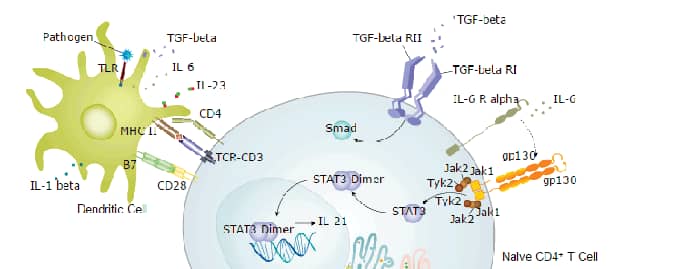Canine IL-12/IL-23 p40 Biotinylated Antibody Summary
Ile23-Ser329
Accession # Q28268
Applications
Please Note: Optimal dilutions should be determined by each laboratory for each application. General Protocols are available in the Technical Information section on our website.
Reconstitution Calculator
Preparation and Storage
- 12 months from date of receipt, -20 to -70 °C as supplied.
- 1 month, 2 to 8 °C under sterile conditions after reconstitution.
- 6 months, -20 to -70 °C under sterile conditions after reconstitution.
Background: IL-12/IL-23 p40
Interleukin 12 (IL-12) and IL-23 are secreted heterodimeric glycoproteins belonging to the IL-12 cytokine family. The two cytokines share a common p40 (40 kDa) subunit, which is disulfide-linked with the p35 (35 kDa) subunit in IL-12, and with the p19 (19 kDa) subunit in IL-23. Canine p40 is synthesized as a 329 amino acid (aa) precursor with a 22 aa signal sequence and a 307 aa mature region. It contains a 90 aa fibronectin type III domain and a 75 aa Ig C2-like region. The expression of p40 is induced by substances such as LPS and CpG that activate antigen-presenting cells. Besides being found as a component of IL-12 or IL-23, free p40 monomers and homodimers are also secreted by cells expressing p40. Canine p40 shares 94%, 85%, 84%, 65%, and 65% aa sequence identity with feline, human, porcine, rat and mouse p40, respectively. Cells known to express p40 include macrophages, dendritic cells, monocytes, Langerhans cells, neutrophils, keratinocytes, plasmacytoid dendritic cells, and microglia. From cells that express both the p35 and p40 subunits (dendritic cells, monocytes, and CHO cells), the amount of free p40 secreted is 10‑1000 fold more than the heterdimeric IL-12. The high-affinity IL-12 receptor complex that transduces IL-12 signals is composed of a 100 kDa ligand-binding subunit (IL-12 R beta 1) and a 130 kDa signal transducing subunit (IL-12 R beta 2). Similarly, the high-affinity IL-23 signaling receptor complex is composed of the shared IL-12 R beta 1 and the unique IL-23 R, a novel gp130-like protein. Both the monomeric and the dimeric free p40 can bind to the IL-12 R beta 1 and function as antagonists of IL-12 or IL-23. However, the monomeric p40 binds IL-12 R beta 1 with lower affinity and is less potent as an IL-12 antagonist. Homodimeric mouse p40 has also been shown to have agonistic functions similar to IL-12, inducing nitric oxide expression and NF kappa B activation in mouse primary microglia and peritoneal macrophages. The molecular mechanism for the agonistic effects of homodimeric p40 has not been determined (1‑6).
- Buttner, M. et al. (1997) Cytokine 10:241.
- Park, A.Y. and P. Scott (2001) Scand. J. Immunol. 53:529.
- Trinchieri, G. et al. (2003) Immunity 19:641.
- Brombacher, F. et al. (2003) Trends Immunol. 24:207.
- Lankford, C.S. and D.M. Frucht (2003) J. Leukoc. Biol. 73:49.
- Abdi, K. (2002) Scand. J. Immunol. 5:1.
Product Datasheets
FAQs
No product specific FAQs exist for this product, however you may
View all Antibody FAQsReviews for Canine IL-12/IL-23 p40 Biotinylated Antibody
There are currently no reviews for this product. Be the first to review Canine IL-12/IL-23 p40 Biotinylated Antibody and earn rewards!
Have you used Canine IL-12/IL-23 p40 Biotinylated Antibody?
Submit a review and receive an Amazon gift card.
$25/€18/£15/$25CAN/¥75 Yuan/¥2500 Yen for a review with an image
$10/€7/£6/$10 CAD/¥70 Yuan/¥1110 Yen for a review without an image





